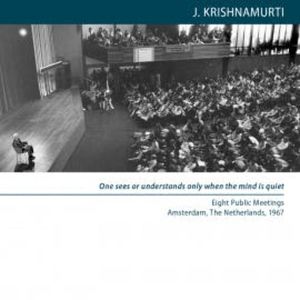1. To look without a concept is to be aware of the observer and the thing observed
- 20 May 1967
Duration: 88 minutes
• Violence and sorrow are not limited to the West or the East; it is part of the
human structure, psychologically.
• Is it possible to bring about a change radically, a total revolution in the psyche
itself, not through time?
• The first and last freedom is when the mind is totally free from concepts and
the mechanical process of building a formula.
• It is an art to look, which is much more important than any art in the world, any
painting, music or book; because when we can look so totally and completely,
being directly in contact, there is an ending.
• Q: If one has cancer, how can one be free from death?
2. Where there is pleasure there is the shadow of pain - 21 May 1967
Duration: 83 minutes
• The whole movement of living, which is relationship, is a movement in action.
• What is consciousness? When do you say, 'I am conscious, I am aware, I am
attentive'?
• Is there actually a division between the conscious and the unconscious, or it is
a total movement, operating all the time?
• The mind that pursues pleasure must inevitably invite its opposite, which is
pain. The two go together; they are not separate.
• You cannot see totally when you are making effort.
• Q: If you love your own child, your attention to your child is fairly complete, but
if you are a teacher you cannot give attention to all the students.
3. Is it possible to renew the mind? - 24 May 1967
Duration: 81 minutes
• When the mind is living through imagination and thought, it is incapable of
living in the complete fullness of the present.
• Thought has created time, not chronological time but psychological time. That
is, 'I will be,' 'I should be.'
• Is it possible for the brain to be quiet, to give an interval between the old and
the new? This interval is the timeless nature in which thought cannot possibly
enter.
• That which has continuity is repetitive, which is time. It's only when time
comes to an end there is something new taking place.
• To die every day to every problem, every pleasure, and not carry over any
problem at all; so the mind remains tremendously attentive, active, clear.
• Since love is not desire or pleasure, how does one come upon it?
• Q: Is the feeling of responsibility a part of the order and discipline you were
talking about?
• Q: Why don't people get angry with what you are saying?
4. Can thought stop? - 28 May 1967
Duration: 72 minutes
• When there is a process of recognition it is the projection of the past. The mind
is always functioning within the field of time, which is of memory. Can the
mind go beyond that?
• What is pleasure and what is desire?
• How is it possible, without control, subjugation or denying, for thought not to
allow itself to interfere?
• When all authority of every kind is put aside, denied, then you can find out for
yourself.
• When you are completely attentive, you see. It is only love that sees - not
thought, the mind or the intellect. One has to learn how to look, how to hear.
• Q: Could you distinguish between what you mean by the word 'recognizing'
and 'being aware'?
• Q: How is one to break off a concept that one has carefully built?
5. It is only a very silent mind that can actually see - 30 May 1967
Duration: 82 minutes
• Conflict exists only when there are two opposing things: fear and non-fear,
violence and non-violence.
• A mind that is in a state of inquiry is entirely different from a mind that is
seeking. Seeking implies effort, conformity, authority and therefore conflict.
• Without space in which there is no boundary, the mind is incapable of coming
upon immeasurable reality.
• It is only a silent mind that can perceive, actually see, not a chattering mind, a
controlled mind, a mind that is tortured, suppressed, yielding or indulging.
One sees or understands only when the mind is quiet.
- Sprecher
- Dauer
- 10 Stunden 59 Minuten
- Verlag
- Typ
- Ungekürzt
- Format
- Hörbuch Download
- ISBN
- 9781912875634
- Sprache
- Englisch
- Kategorie
Vollversion anhören
Inbegriffen in der Streaming Flatrate
Enthalten im Audioteka Club Abo
- Dieser und weitere 75.000 Titel enthalten in der Streaming Flatrate
- Exklusiver Abonnent*innen Preis für Titel, die nicht im Streaming verfügbar sind
- Keine Stundenlimits innerhalb der Flatrate
- Deutsche und internationale Bestseller gelesen von den besten deutschen Stimmen
14,99 €
Preis außerhalb des Clubs
Beschreibung
Bewertungen und Rezensionen
Nur angemeldete Nutzer können Bewertungen abgeben. Jetzt anmelden
Die Meinungen stammen von angemeldeten Kunden, die unser Produkt oder unsere Dienstleistung gekauft haben. Die Meinungen werden in Übereinstimmung mit den Bewertungsrichtlinien gesammelt, überprüft und veröffentlicht.
Vollversion anhören
Inbegriffen in der Streaming Flatrate
Enthalten im Audioteka Club Abo
- Dieser und weitere 75.000 Titel enthalten in der Streaming Flatrate
- Exklusiver Abonnent*innen Preis für Titel, die nicht im Streaming verfügbar sind
- Keine Stundenlimits innerhalb der Flatrate
- Deutsche und internationale Bestseller gelesen von den besten deutschen Stimmen
14,99 €
Preis außerhalb des Clubs
